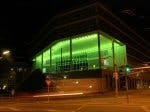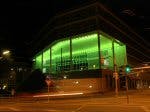Three strikes but not out…yet
The US District Court for the District of Massachusetts has ruled in favor of Color Kinetics on three separate occasions in recent months. The rulings relate to the following lawsuits:
• March 2002: SV files lawsuit seeking to have certain CK patents ruled invalid
• June 2002: CK files lawsuit claiming infringement by SV of certain CK patents
• March 2004: SV files infringement lawsuit against CK over "687" patent
Strike 1: Color Kinetics' summary judgment motion granted (April 2005)
Color Kinetics' motion was granted for summary judgment regarding three of Super Vision's claims relating to interference with prospective business relationships, trade disparagement and defamation.
Strike 2: Color Kinetics wins summary judgment rulings (Aug 2005)
The court ruled that a group of five patents granted to Color Kinetics are valid, and that various Super Vision products infringe on certain of these patents. SV plans to appeal in the US Patent Appeals court.
Strike 3:Super Vision patent lawsuit dismissed (Sept 2005)
Super Vision's lawsuit against Color Kinetics alleging infringement of the Variable Color Lighting Systems patent was dismissed. SV plans to re-file.
Super Vision struggles
Most recently, the lawsuit filed in March 2004 by Super Vision alleging that Color Kinetics is infringing US patent no. 4,962,687 was dismissed. The patent in question was acquired by Super Vision from High End Systems, and is entitled "Variable Color Lighting Systems".
The court determined that Super Vision, rather than being the owner of the patent, was a non-exclusive licensee, and as such had no right to enforce the patent. However, the court did not rule out the possibility of a future lawsuit, should Super Vision acquire the appropriate rights from the patent owner.
Super Vision says that it will "review the court's dismissal in depth and file another suit against Color Kinetics." It also believes that the ruling "will have no impact on Super Vision's ability to prevail on the merits of its infringement claims."
Only 3 weeks previously, the judge issued a summary judgment ruling in favor of Color Kinetics, stating that the company's patents in question were valid and that certain Super Vision products infringed on some of those patents. Super Vision stated that it intends to appeal against this ruling, and is confident that it will have more success in front of the U.S. Patent Appeals Court in Washington.
In a message to LED Alliance supporters, Brett Kingstone, president and CEO of Super Vision, wrote "although there can be no guarantee of success, our attorneys are still very confident in our ability to return this case to a jury trial on the merits, based on significant errors in prior rulings both in fact and law." An appeal has already been filed against the first round of summary judgment rulings that went in favor of Color Kinetics.
This provides little comfort to the many LED fixture manufacturers on the sidelines of this dispute. However, some are not standing still. At September's PLASA show, Tryka L.E.D. Ltd unveiled its Intelligent Drive System products. These utilize Pulse Amplitude Modulation technology, which has been patented around the world, and represents an alternative to the pulse width modulation (PWM) technique around which many of the contentious Color Kinetics patents are based.
European companies remain concerned, even though a group of them, including Vossloh-Schwabe and Lagotronics, have banded together to challenge Color Kinetics' patent applications in Europe. Third parties can file observations at the application stage, or can file an opposition to the patent up to nine months after the patent is granted.
Jörn Bielich, managing director of DigitalLicht AG of Freigericht, Germany, has some fairly typical views. "Clients such as architects and lighting designers want to choose from a plurality of manufacturers with a wide range of products," he says. "They want to have an open market with fair competition. If other companies stop developing new technologies and products [because of pressure from CK] then the enormous growth of the LED market will slow down."
Others, such as Jed Dorsheimer of Adams Harkness (see see Story), think that the recent rulings in favor of CK will allow the industry to move forward. Detlef Eobaldt, sales & marketing manager of Lagotronics, has a similar view. "Yes, the CK patents might be obstacles, but so are other patents in other industries," he says. "My intention is to move the industry forward without turning around in circles and leaving the whole thing to the lawyers."






